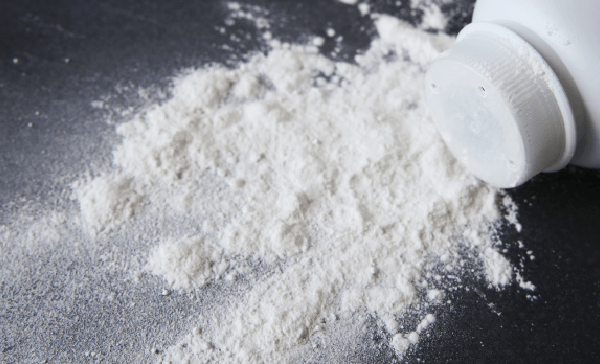Johnson & Johnson
Johnson & Johnson® is arguably the most well-known talcum powder company. For over a century, Johnson & Johnson has been selling baby powder products for both babies and adults. However, new lawsuits have linked some Johnson & Johnson powders to cancer. Despite this, Johnson & Johnson continues to sell talcum powder to the general public.
Why Take Legal Action?
By filing a product liability lawsuit, you can pursue financial compensation and justice from the companies that caused you or a loved one harm.
Results Secured
- $40 million for a veteran exposed to asbestos from Goodyear gaskets
- $1.16 million for a Roundup® victim in North Dakota
- $575,000 for a man in Florida who suffered chemical burns from Just for Men® hair dye
An Overview of Johnson & Johnson
Johnson & Johnson is one of the best-known baby powder companies. It has been selling talcum powder for over 120 years. As the company grew in popularity, its baby powder became one of its most famous products.
Generations of women used baby powder on themselves and their children to prevent rashes, body odor and more. Talc, the main ingredient of their baby powder, helps absorb moisture and reduce friction.
In the present day, Johnson & Johnson continues to sell baby powder sourced from China in stores nationwide, such as Target, Walgreens, Walmart and Rite Aid.
However, new lawsuits have connected their talcum powder to ovarian cancer. Recently released documents from the company’s archives reveal that trace amounts of cancer-causing materials were found in some samples of their talc.
Thousands of women and their families are now suing the company, which denies that its talcum powder is dangerous.
Most recently in April 2023, Johnson & Johnson tried to dodge the liabilities connected to these and other cancer lawsuits by offering $9 billion to settle them.
Beginnings of Baby Powder
Johnson & Johnson began selling its baby powder among many other health products in 1894. However, the baby powder soon became a flagship product for the company. Before long, the company marketed the product not only to care for babies. They also positioned the product as useful for people at all stages of life to stay fresh and clean.
Baby Powder and Talc
The main ingredient of Johnson & Johnson’s baby powder is talc, a naturally found mineral. Talc is easily mined from deposits found across the world.
When talc is ground up, it is able to absorb moisture. Therefore, it helps prevent skin irritation common in newborns wearing diapers. Although talc itself is not dangerous, cancer-causing materials are sometimes found in it.
Johnson & Johnson promoted its baby powder with a huge ad campaign after World War I. According to the company’s official historian, the advertisements linked baby powder to a good mother-and-child bond. This elevated the public’s trust in the company to near reverence.
Trouble in the 20th Century
As the company expanded, it added more talcum powder products to its lineup. Some of these products were marketed toward teenagers and adults, such as its Shower to Shower powder®. This powder is a blend of talc and cornstarch used to stop body odor and keep the skin fresh.
Even in present day, the company encourages sprinkling Shower to Shower powder on your bedding, shoes and skin after a shower to keep them fresh. However, the product has been linked to cancer along with Johnson & Johnson’s baby powder.
Throughout the decades, countless advertisements promoted the safe use of talcum powder for everyone. However, lawsuits brought against Johnson & Johnson revealed that the company hid the truth from the public.
Reuters, an investigative news outlet, studied memos and data that came to light during these lawsuits. According to their report, Johnson & Johnson first discovered small amounts of cancer-causing materials in their talcum powder in 1958.
These materials were found in samples of talc from an Italian talc mine. Later, trace amounts of cancer-causing materials were discovered in talc samples taken from the mines that Johnson & Johnson operated in Vermont.
The report states that in the 1970s, the FDA began investigating the link between talcum powder and cancer.
During this time, Johnson & Johnson:
- Denied finding cancerous materials in their talc, even though some studies had found small amounts of them
- Submitted findings which left out any studies that found even trace amounts of cancerous materials in their talc
- Produced and published studies written specifically to downplay the link between talc and cancer
- Created memos and campaigns to emphasize the safety of talc
FDA tests were inconclusive. However, the Reuters report states the agency’s detection methods may not have been detailed enough to detect the cancerous materials.
Trace amounts of cancer-causing materials continued to be found from the 1980s to the mid-2000s when Johnson & Johnson began to source its talc from China. FDA tests on this talc have not found cancerous materials in it.
Though a talc-free powder was introduced in the 1980s, Johnson & Johnson continued to sell baby powders and Shower to Shower powders that used talc as a main ingredient.
Legal Concerns in the 21st Century
In recent years, more and more women have come forward with lawsuits against Johnson & Johnson. These women, who used Johnson & Johnson’s baby powder or Shower to Shower powder for most of their lives, developed ovarian cancer.
Juries have awarded some of these women and their families billions of dollars depending on the suit. Individual lawsuits from 2016-2018 awarded millions to the families of women who were affected.
The biggest blow to Johnson & Johnson thus far came in 2018, when a Missouri jury awarded 22 women and their families nearly $4.7 Billion in damages. The company attempted to overturn this verdict but failed.
However, some lawsuits have ruled in favor of Johnson & Johnson, which maintains that its baby powders do not cause cancer. The company plans on challenging the lawsuits they lost and continues to sell its baby powder in stores across the globe.
Your Next Steps
Due to the recent lawsuits against Johnson & Johnson, you may be worried that you or someone you love is at risk of developing ovarian cancer. Though there is no way to completely prevent ovarian cancer, you can take action against neglectful talc companies.
If you regularly used talc-based baby powder, consult your doctor if you are concerned. They can closely monitor your health. You can also learn more about the symptoms and preventions for ovarian cancer as a precaution.
You may also decide to take legal action if you believe that talcum powder caused you to develop ovarian cancer. Call a nurse case manager today at (866) 463-9532 for a free legal consultation.
Fact-Checked and Legally Reviewed by: LawFirm.com
LawFirm.com makes it easier to take legal action. We have information, lawsuit guides, and breaking news about drugs, products, and other issues that could affect you.
- Feldman, N. (2018, December 20). Philly plaintiff nears closure in Johnson & Johnson cancer lawsuit. Retrieved January 17, 2019, from https://www.phillytrib.com/news/local_news/philly-plaintiff-nears-closure-in-johnson-johnson-cancer-lawsuit/article_9424d6c2-0f4d-5788-9322-0439ff021a55.html
- Girion, L. (2018, December 14). J&J knew for decades that asbestos lurked in its Baby Powder. Retrieved January 18, 2019, from https://www.reuters.com/investigates/special-report/johnsonandjohnson-cancer/
- Gurowitz, M. (2007, April 30). The Birth of Our Baby Products. Retrieved January 17, 2019, from https://www.kilmerhouse.com/2007/04/the-birth-of-our-baby-products
- Johnson & Johnson. (n.d.). Baby Products for Adults. Retrieved January 18, 2019, from https://www.johnsonsbaby.com/baby-products-for-adults
- Johnson & Johnson. (n.d.). Company history. Retrieved January 17, 2019, from https://www.jnj.ch/en/about-us/company-history.html
- Johnson & Johnson. “Johnson & Johnson Subsidiary LTL Management LLC (“LTL”) Re-Files for Voluntary Chapter 11 to Equitably Resolve All Current and Future Talc Claims.” Retrieved from: https://www.jnj.com/ltl-update. Accessed on April 21, 2023.


 Get a Free Talcum Powder Case Review
Get a Free Talcum Powder Case Review